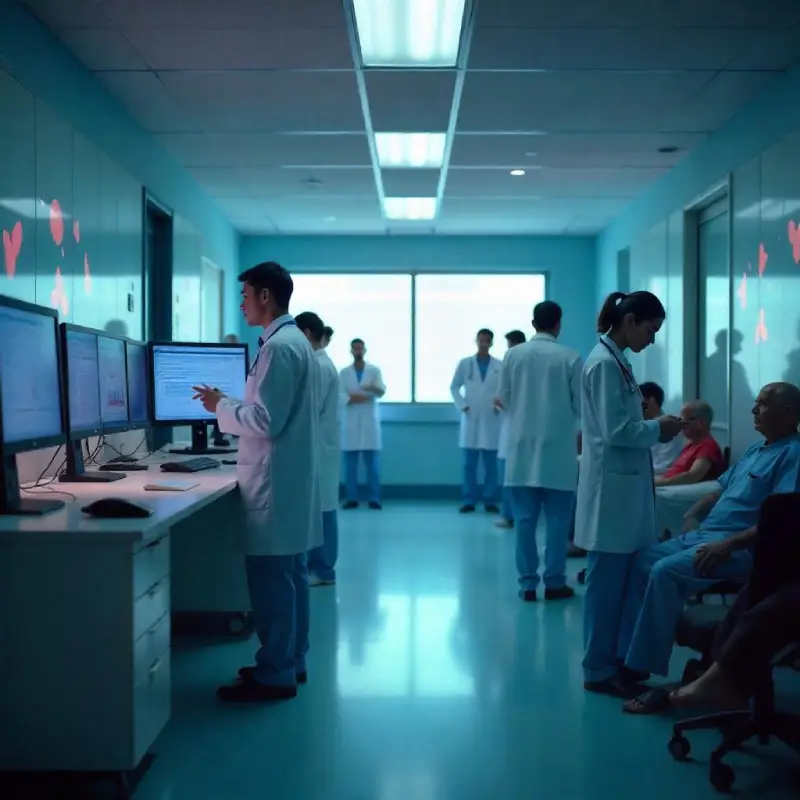Hospital Management Software in Bangladesh
Patient Management
Billing & Financial Management
Inventory & Pharmacy Management
Laboratory & Diagnostic Integration
Staff & HR Management
Dashboards & Analytics
MS Solution has emerged as the leading provider of hospital management software (HMS) in the country. Renowned for its affordability, efficiency, and user-friendly design, MS Solution’s software is transforming healthcare management across Bangladesh. This article explores why MS Solution is the best hospital management software in Bangladesh, its features, pricing, and how it compares to other systems.
MS Solution | Best Hospital Management Software in Bangladesh
Revolutionizing Healthcare in Bangladesh: Why MS Solution Offers the Best Hospital Management System
The healthcare landscape in Bangladesh is evolving rapidly. As hospitals and clinics strive to provide better patient care, improve operational efficiency, and manage resources effectively, the need for robust, reliable, and comprehensive technological solutions has become paramount. Manual processes, scattered data, long queues, and administrative bottlenecks are no longer sustainable in the face of increasing patient load and the demand for higher quality services.
This is where a modern Hospital Management System (HMS) steps in. More than just software, an HMS is the digital backbone of a healthcare institution, integrating various departments and functions into a cohesive, streamlined operation. For hospitals and clinics across Bangladesh, choosing the right HMS isn’t just an IT decision; it’s a strategic move that impacts patient care, staff productivity, financial health, and overall growth.
In this dynamic environment, MS Solution has emerged as a significant player, offering a comprehensive suite designed specifically for the unique challenges and requirements of the Bangladeshi healthcare sector. When you search for “Hospital management system BD” or “Hospital management software in Bangladesh,” MS Solution consistently appears as a provider committed to delivering quality and value.
This article delves deep into what makes a Hospital Management System essential, explores the core functionalities required for effective Hospital Services Management, discusses the factors influencing Hospital Management System Price in Bangladesh and Hospital Management software Price in Bangladesh, touches upon the intricacies of a hospital management system project, explains the foundational concept of an ER diagram for hospital management system, and ultimately highlights why MS Solution’s offering stands out as potentially the best hospital management software in Bangladesh.
We’ll also briefly look at concepts like free hospital management software, what makes a most popular hospital management software, and the benefits of having a hospital management software online.
The Challenges Facing Healthcare Providers in Bangladesh
Before diving into solutions, it’s vital to understand the problems that necessitate an HMS. Many hospitals and clinics in Bangladesh grapple with:
- Inefficient Patient Management: Slow registration, difficulty in scheduling appointments, misplaced physical records, and long waiting times frustrate both patients and staff.
- Fragmented Information: Patient history, lab results, prescriptions, and billing information are often stored in disparate systems or physical files, leading to delays, errors, and incomplete patient profiles.
- Operational Bottlenecks: Managing pharmacy inventory, lab workflows, radiology appointments, and physician schedules manually is time-consuming and prone to mistakes.
- Revenue Cycle Management Issues: Inaccurate billing, missed charges, difficulty tracking payments, and complex insurance processing can significantly impact a hospital’s financial health.
- Lack of Data for Decision Making: Without centralized data and reporting capabilities, hospital administrators struggle to analyze performance, identify trends, and make informed strategic decisions.
- Compliance and Security: Maintaining patient data privacy and adhering to evolving healthcare regulations is challenging with manual or outdated systems.
- Communication Gaps: Poor communication between doctors, nurses, lab technicians, and administrative staff can affect patient care quality.
These challenges underscore the urgent need for a unified, digital solution to streamline Hospital Services Management.
What Exactly is a Hospital Management System (HMS)?
At its core, a Hospital Management System (HMS) is an integrated software suite designed to manage all the operational, administrative, clinical, and financial aspects of a hospital or healthcare facility. It connects different departments – outpatient department (OPD), inpatient department (IPD), pharmacy, laboratory, radiology, billing, HR, administration, etc. – through a single, centralized database.
The primary goals of an HMS are to:
- Improve patient care quality and safety.
- Enhance operational efficiency and reduce costs.
- Streamline workflows and minimize administrative burden.
- Improve communication and collaboration among staff.
- Provide accurate data for reporting and decision-making.
- Ensure data security and regulatory compliance.
Implementing an HMS is a significant undertaking, often referred to as a hospital management system project. It involves careful planning, customization, data migration, staff training, and ongoing support to ensure successful adoption and maximum benefit realization.
MS Solution: Tailoring Technology for Bangladesh’s Healthcare Needs
In the context of Bangladesh, a successful HMS must not only be technologically advanced but also adaptable to local practices, infrastructure, and regulatory requirements. This is where MS Solution distinguishes itself. With a deep understanding of the Bangladeshi healthcare ecosystem, MS Solution has developed an HMS that addresses local challenges while incorporating global best practices.
MS Solution aims to be recognized as providing the best hospital management software in Bangladesh by focusing on usability, comprehensiveness, reliability, and local support. Their system is designed to be more than just a collection of modules; it’s an integrated platform intended to transform how hospitals operate.
When hospitals in Bangladesh look for a Hospital management system BD provider, they seek a partner who understands their specific needs – from managing patient flow in busy urban centers to ensuring data accessibility in more remote areas. MS Solution positions itself as that trusted partner.
Key Features and Modules Offered by MS Solution’s HMS
A robust HMS like the one offered by MS Solution comprises various modules working together seamlessly. While the exact configuration can be tailored based on the size and specific needs of a hospital, here are some core components you would typically find:
Patient Registration and Management:
- Fast and accurate patient registration with unique IDs.
- Managing patient demographics, contact information, and medical history.
- Appointment scheduling for various departments and doctors.
- Queue management for OPD.
Outpatient Department (OPD) Management:
- Doctor consultation management.
- Prescription generation (often integrated with pharmacy).
- Ordering lab tests and radiology investigations.
- Managing follow-up appointments.
Inpatient Department (IPD) Management:
- Admission, discharge, and transfer (ADT) processes.
- Ward and bed management.
- Managing doctor rounds and treatment plans.
- Nursing station management.
Electronic Medical Records (EMR) / Electronic Health Records (EHR):
- Creating and maintaining digital patient charts.
- Recording medical history, diagnoses, allergies, medications, treatment plans, and progress notes.
- Secure access for authorized healthcare professionals.
- This is a cornerstone of modern Hospital Services Management, ensuring comprehensive patient data is readily available.
Billing and Financial Management:
- Generating accurate bills for services rendered (OPD, IPD, lab, pharmacy, etc.).
- Managing different payment methods (cash, card, mobile payments).
- Handling insurance claims and corporate billing.
- Tracking outstanding payments and managing accounts receivable.
- Integration with accounting systems.
- Generating accurate bills for services rendered (OPD, IPD, lab, pharmacy, etc.).
Pharmacy Management:
- Inventory management for medicines and consumables.
- Managing purchases, stock levels, and expiry dates.
- Dispensing medications based on prescriptions.
- Generating sales reports.
Laboratory Information System (LIS):
- Managing lab test orders.
- Sample collection tracking.
- Recording test results.
- Generating lab reports (often with digital signatures).
- Integration with laboratory equipment.
Radiology Information System (RIS):
- Managing radiology investigation orders (X-ray, Ultrasound, CT Scan, MRI).
- Scheduling appointments.
- Recording findings and generating reports.
- Potentially integrating with PACS (Picture Archiving and Communication System) for image management.
Inventory Management:
- Tracking hospital supplies, equipment, and consumables beyond the pharmacy.
- Managing stock levels, reorder points, and supplier information.
- Reducing waste and pilferage.
- Tracking hospital supplies, equipment, and consumables beyond the pharmacy.
Human Resources and Payroll:
- Managing employee information, attendance, shifts, and payroll.
- Managing employee information, attendance, shifts, and payroll.
Reporting and Analytics:
- Generating various reports on patient statistics, revenue, expenses, inventory, doctor performance, etc.
- Providing dashboards for administrators to monitor key performance indicators (KPIs).
- Crucial for informed decision-making and strategic planning in Hospital Services Management.
- Generating various reports on patient statistics, revenue, expenses, inventory, doctor performance, etc.
Security and Access Control:
- Implementing user roles and permissions to ensure data security and privacy.
- Audit trails to track system activity.
MS Solution understands that the specific combination of these modules is crucial for a hospital’s unique workflow, making their system highly customizable.
The Benefits: Why Implement MS Solution’s HMS?
Implementing a comprehensive system like MS Solution’s brings transformative benefits to a hospital:
- Improved Patient Care: Faster registration, readily available patient history through EMR/EHR, reduced medication errors, and better communication lead to higher quality and safer patient care.
- Increased Efficiency: Automation of routine tasks, streamlined workflows, and reduced paperwork free up staff time, allowing them to focus more on patients.
- Reduced Costs: Better inventory management minimizes waste, accurate billing reduces revenue leakage, and improved efficiency lowers operational expenses.
- Enhanced Revenue Cycle: Accurate and timely billing, improved claims management, and better tracking of receivables improve the hospital’s financial health.
- Better Decision Making: Access to real-time data and comprehensive reports empowers administrators to make data-driven decisions regarding resource allocation, service expansion, and operational improvements.
- Improved Staff Productivity and Satisfaction: Streamlined processes reduce frustration and workload, leading to higher job satisfaction.
- Enhanced Security and Compliance: Centralized data with strong access controls and audit trails helps protect patient information and meet regulatory requirements.
- Competitive Advantage: Hospitals utilizing modern HMS can offer a better patient experience and more efficient services, giving them an edge in the competitive healthcare market.
These benefits are tangible outcomes of a well-executed hospital management system project using a capable software like MS Solution’s.
The Technical Foundation: Understanding the ER Diagram for Hospital Management System
While most hospital staff won’t need to understand the deep technical architecture, it’s worth noting that a reliable HMS is built on a solid foundation. One key aspect of designing such a system is creating an Entity-Relationship (ER) diagram.
An ER diagram for hospital management system is essentially a blueprint that visually represents the structure of the database. It shows the different “entities” (like Patient, Doctor, Appointment, Ward, Medicine, Bill) and how they “relate” to each other. For example, a Patient entity relates to an Appointment entity, which relates to a Doctor entity. A Doctor entity relates to a Department entity, and so on.
A well-designed ER diagram is crucial because it ensures:
- Data Integrity: Relationships are correctly defined, preventing inconsistencies.
- Efficient Data Retrieval: The database is structured logically for fast access to information.
- Scalability: The system can grow and accommodate more data and users.
- Maintainability: It’s easier to update and modify the system in the future.
When MS Solution develops its HMS, creating a robust hospital management system er diagram is a fundamental step, ensuring the software is stable, reliable, and capable of managing complex hospital data effectively. While you won’t be looking at the diagram itself, its quality directly impacts the performance and dependability of the software you use daily.
Navigating Cost: Hospital Management System Price in Bangladesh
One of the most frequently asked questions when considering an HMS is about cost. The Hospital Management System Price in Bangladesh is not a fixed figure; it varies significantly based on several factors:
- Size of the Hospital/Clinic: A small clinic requires fewer modules and user licenses than a large multi-specialty hospital.
- Required Modules: The price depends on which specific modules (OPD, IPD, EMR, Pharmacy, Lab, etc.) the hospital needs. A more comprehensive suite will cost more.
- Customization Needs: Hospitals with unique workflows or specific reporting requirements may need customization, which adds to the cost.
- Deployment Model:
- On-Premises: The software is installed on the hospital’s own servers. This usually involves a higher upfront cost for licenses and hardware but potentially lower recurring fees (other than maintenance and support).
- Cloud-Based (SaaS – Software as a Service): The software is hosted on the vendor’s servers (often accessible as hospital management software online). This typically involves lower upfront costs but recurring subscription fees (monthly or annual). Cloud solutions offer advantages in accessibility, scalability, and reduced IT burden for the hospital.
- Licensing Model: Is it a one-time perpetual license or an annual/monthly subscription?
- Implementation, Training, and Support: The cost of getting the system up and running, training staff, and ongoing technical support are crucial components of the overall price.
When evaluating Hospital Management software Price in Bangladesh, hospitals must look beyond the initial software cost and consider the total cost of ownership (TCO), including implementation, training, hardware (if on-premises), maintenance, and support.
MS Solution understands the economic realities of the Bangladeshi market and aims to offer flexible pricing models that provide excellent value. They work closely with hospitals to assess their needs and propose a solution that fits their budget while delivering the necessary functionality for effective Hospital Services Management. It’s always best to contact them directly for a tailored quote based on your specific requirements.
Exploring Alternatives: Free Hospital Management Software
While searching for solutions, hospitals might come across options for free hospital management software. These can be tempting, especially for smaller clinics or those with limited budgets. However, it’s crucial to evaluate the limitations of free software:
- Limited Features: Free versions often lack advanced modules critical for larger hospitals (e.g., comprehensive EMR, advanced reporting, specific integrations).
- Lack of Support: Free software typically comes with minimal or no dedicated technical support. Troubleshooting issues can be difficult and time-consuming.
- Scalability Issues: Free solutions may not be designed to handle the increasing data and user load as a hospital grows.
- Security Concerns: The security and privacy features might not be as robust as commercial options, which is critical for sensitive patient data.
- No Customization: Free software is rarely customizable to a hospital’s specific workflows.
- Sustainability: The long-term viability and updates of free software projects can be uncertain.
For established hospitals and those planning for future growth, investing in a reliable commercial HMS from a reputable provider like MS Solution is generally a safer and more effective long-term strategy for ensuring quality Hospital Services Management. The initial investment in a paid system often pays off through increased efficiency, reduced errors, better revenue management, and reliable support.
Why MS Solution Aspires to be the Most Popular Hospital Management Software
Becoming the most popular hospital management software isn’t just about having the most users; it’s about reputation, reliability, and results. MS Solution’s strategy in Bangladesh focuses on several key areas to achieve this:
- Local Expertise: Understanding the specific needs, workflows, and regulatory environment of Bangladeshi hospitals is a major advantage.
- Comprehensive Feature Set: Offering a wide range of integrated modules that cover all aspects of hospital operations.
- User-Friendliness: Designing an intuitive interface that requires minimal training for doctors, nurses, and administrative staff.
- Reliable Support: Providing timely and effective local technical support and maintenance.
- Successful Implementations: Building a track record of successful hospital management system project deployments and satisfied clients.
- Flexibility: Offering customizable solutions and flexible deployment options (on-premises or potentially hospital management software online via cloud).
- Continuous Improvement: Investing in research and development to add new features and adapt to evolving healthcare technologies.
By excelling in these areas, MS Solution is building trust and demonstrating its value to healthcare providers across Bangladesh, positioning itself as a strong contender for the title of the most preferred HMS provider.
The Future is Digital and Connected: Hospital Management Software Online
The trend towards hospital management software online (cloud-based solutions) is growing globally, and Bangladesh is no exception. Cloud-based HMS offers several advantages:
- Accessibility: Access the system from anywhere with an internet connection, facilitating remote work, multi-location management, and access for doctors on the go.
- Reduced IT Infrastructure Costs: Hospitals don’t need to invest heavily in servers and maintenance.
- Scalability: Easily scale resources up or down based on need.
- Automatic Updates and Backups: The vendor handles software updates and data backups.
- Enhanced Collaboration: Facilitates easier data sharing and collaboration between different branches or affiliated clinics.
While on-premises solutions still have their place, especially for hospitals with specific data security policies or limited internet connectivity, the convenience and flexibility of hospital management software online are increasingly appealing. MS Solution offers options that cater to different deployment preferences, ensuring hospitals can choose the model that best suits their needs and infrastructure.
Embarking on Your Hospital Management System Project with MS Solution
Choosing and implementing an HMS is a significant undertaking – a true hospital management system project. It requires careful planning, stakeholder involvement (doctors, nurses, administrators, IT staff), and a phased approach. MS Solution works as a partner throughout this process:
- Needs Assessment: Understanding the hospital’s current workflows, challenges, and specific requirements.
- Solution Design: Proposing a tailored HMS configuration with the necessary modules.
- Customization: Adapting the software to fit the hospital’s unique processes if required.
- Data Migration: Safely transferring existing patient and operational data to the new system.
- Implementation and Configuration: Installing and setting up the software.
- Training: Comprehensive training for all staff who will use the system.
- Go-Live: Launching the system and providing on-site support during the initial phase.
- Post-Implementation Support: Ongoing technical support, maintenance, and updates.
This structured approach minimizes disruption and ensures a smooth transition to the new system, maximizing the chances of a successful hospital management system project.
Conclusion: Partnering with MS Solution for a Brighter Healthcare Future in Bangladesh
The digital transformation of healthcare is not a luxury but a necessity for hospitals in Bangladesh aiming to provide high-quality, efficient, and patient-centric care. A comprehensive Hospital Management System is the foundation of this transformation.
MS Solution, with its deep local understanding, comprehensive feature set, commitment to support, and flexible solutions, stands ready to be the technology partner for hospitals across the nation. Their aim to provide the best hospital management software in Bangladesh is backed by a focus on solving real-world problems faced by healthcare providers.
Whether you are a large hospital or a growing clinic, implementing a robust HMS will streamline your Hospital Services Management, improve financial performance, empower your staff, and ultimately enhance the patient experience.
While considering the Hospital Management System Price in Bangladesh and Hospital Management software Price in Bangladesh, remember the long-term benefits and return on investment that a quality system provides compared to the limitations of free hospital management software. MS Solution offers competitive pricing and flexible options to make this crucial investment accessible.
Choosing MS Solution means choosing a partner dedicated to your success in the evolving healthcare landscape. From understanding the intricacies represented by a well-designed ER diagram for hospital management system to providing accessible solutions potentially as hospital management software online, they cover the spectrum of needs. They are striving to be recognized as the most popular hospital management software provider by delivering results.
If you are ready to transform your hospital’s operations and elevate the standard of care, connect with MS Solution today.
Contact MS Solution to learn more:
☎️ +88 01817 573333
Invest in the future of your hospital and the health of your community with a leading Hospital management system BD provider.





